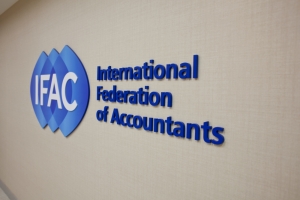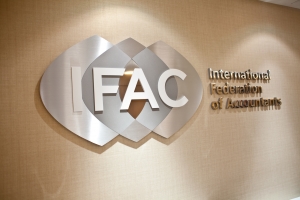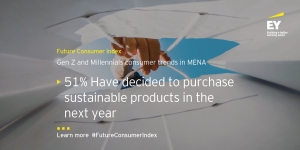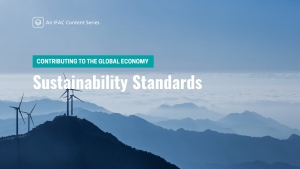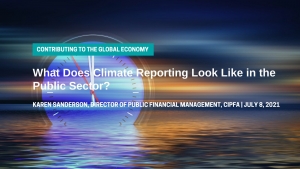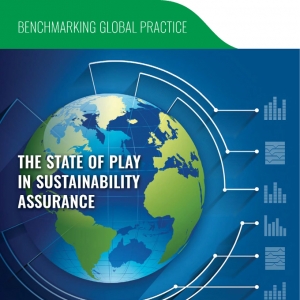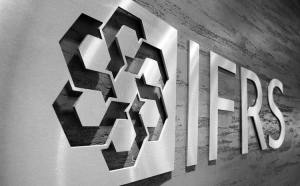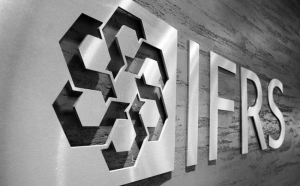عرض العناصر حسب علامة : تقارير الإستدامة
إعادة تقرير الشركات
معلومات إضافية
-
المحتوى بالإنجليزية
Enhancing Corporate Reporting
Corporate reporting should capture all relevant information about organizations. However, investors and other stakeholders are demanding more, higher-quality information and insights about company performance, risks, opportunities, and long-term prospects than are available from the conventional financial reporting process. To be accountable, companies need to provide a clear and comprehensive picture of their organization’s ability to create sustainable value over time.
IFAC sees a significant opportunity to enhance trust in companies and confidence in markets by including information in corporate reporting that is relevant, reliable, and comparable with respect to measures derived from the financial statements (i.e., “non-GAAP” or “non-IFRS” measures), other “Key Performance Indicators” connected to financial performance, and broader information related to value creation, sustainability or environmental, social, and governance factors.
Our partnership with the International Integrated Reporting Council shows our support for enhancing corporate reporting by including a broader scope of narrative disclosures and metrics. Integrated thinking and forward-looking reporting enable organizations to communicate effectively — and stakeholders to understand — prospects for longer-term value creation. A number of additional standard-focused initiatives and frameworks have also emerged to convey this information.
PRINTER FRIENDLY VERSION
Translation Available in
EN ENGLISH
AR ARABIC
FR FRENCH
RU RUSSIAN
ES SPANISH
1. Need for Enhancing the Corporate Reporting System
2. Integrated Reporting
3. Role of Accountancy Profession in Enhancing Corporate Reporting
4. The Way Forward
1. Need for Enhancing the Corporate Reporting System
The corporate reporting landscape has become a mosaic of mandatory and voluntary disclosures under various frameworks and standard-setting initiatives – primarily focused on value creation, sustainability, and environmental, social and governance factors. Stakeholders find it difficult to rationalize the information being provided and to understand the linkage to financial information.1
IFAC believes that this reporting ecosystem, consisting of multiple and competing reporting workstreams, does not best serve the interests of capital markets, companies or their stakeholders. The resulting complexity and lack of comparability can lead to inefficiency and increased costs — for both companies and investors.2
IFAC supports the development of and convergence towards relevant, reliable, and comparable narrative information and metrics (e.g., non-monetary volumes, number counts, ratios, percentages, etc.) for which suitable criteria can be developed to facilitate assurance conclusions.
IFAC believes that such broader-based corporate reporting serves the public interest and that alignment needs to occur before a fragmented or regional approach to reporting and regulation becomes ensconced as standard practice. Both companies and investors increasingly support this approach.3 Ideally, coalescing around best market practices or accepting a single set of high-quality standards should occur before regulatory intervention.
IFAC supports the efforts of all participants in the Corporate Reporting Dialogue, the Task Force on Climate-Related Financial Disclosures, World Business Council for Sustainable Development, and other organizations who contribute valuable input toward the goal of enhancing corporate reporting. At the same time, IFAC reiterates the need for the emergence and implementation of a uniform, global approach.
2. Integrated Reporting
The International Integrated Reporting Council’s umbrella framework provides a basis for narrative information and metrics that enable organizations to more effectively communicate their ability to create value over time.
IFAC believes that integrated reporting, bringing together the relevant information about a company, provides a holistic picture of performance and provides insights on an organization’s ability to create sustainable value over time. Integrated reporting enables companies of all sizes and sectors and their stakeholders to focus on the key factors (or “multiple capitals”) relevant to long term value creation through the lens of governance, strategy, and the business model.
Crucially, we believe that integrated reporting supports “integrated management thinking” - which fosters organizational decision-making and change focused on broader, longer term value creation. Integrated thinking will hopefully lead to better outcomes from corporate reporting that addresses systemic risks to capital and financial market systems and sustainable development challenges.
We encourage regulators and standard-setters to use the International Integrated Reporting Framework as a foundation for incorporating and organizing information about value creation and impacts, including narrative reporting and metrics from the various standard-setting initiatives. A common framework can facilitate the development of best practices and standardization.
In many jurisdictions, the management report (“MD&A” or equivalent) might be the most appropriate channel for including integrated and supplementary narratives and metrics. IFAC supports the efforts of the IASB to update guidance in its Management Commentary Practice Statement – intended to be compatible with jurisdictional requirements and various frameworks and initiatives such as integrated reporting.
3. Role of Accountancy Profession in Enhancing Corporate Reporting
The profession has a key role to play in the development and implementation of reporting frameworks and standard-setting initiatives that go beyond traditional financial reporting, including development of robust internal control processes and systems, assurance, as well as identifying, measuring, and reporting relevant metrics that are supported by best practices or reporting standards.
IFAC believes that the technical skills, business expertise, and trusted professionalism of accountants are key requirements to working effectively with standard setters, reporting entities, regulators, and other interested stakeholders toward the goal of enhancing corporate reporting. Professional accountants, as employees in a business or as practitioners in a firm, help companies formulate strategies, measure and manage performance, implement reporting and internal control systems, analyze information, and develop governance and risk management policies. These activities are key to the evolution of evidence-based decision-making, reliable information gathering, and consistent and comparable reporting on matters of value creation, sustainability, or environmental, social and governance factors.
IFAC believes that assurance is critical to confidence in corporate reporting and delivering relevant, reliable, and comparable information. Efforts like the IAASB’s initiative on Extended External Reporting (February 2019) - intended to advance the assurance of non-financial information (including integrated reporting, sustainability reporting, and other reporting about environmental, social, or governance matters) - can improve user confidence, enhance access to capital, assist companies in developing systems and processes, and promote comparability. IFAC supports additional work towards the evolution of assurance practice with respect to non-financial information.
We believe engagement with the accountancy profession, given the trend towards enhancing the scope of corporate reporting, will maximize the benefit to reporting entities and their stakeholders. The profession must meet the challenge of developing new areas of expertise necessary to support enhancing corporate reporting.
4. The Way Forward
The time for a global solution is now—to answer the demand from investors, policymakers and other stakeholders for a reporting system that delivers consistent, comparable, reliable, and assurable information relevant to enterprise value creation, sustainable development and evolving expectations. A fragmented approach perpetuates inefficiency, increased cost, and a lack of trust. Important work is underway (e.g., WEF/IBC metrics, IOSCO’s task force, EFRAG’s preparatory work, and alignment between the leading reporting initiatives), and these efforts should continue and ultimately contribute to the emerging global system.
Global Approach: A new standard setting board is necessary to build and coordinate a coherent global system of interconnected corporate reporting.
Structure
The IFRS Foundation, with an enhanced remit and composition, should create an International Sustainability Standards Board (“ISSB”), leveraging the independence and success of IFRS governance (i.e., Monitoring Board and IFRS Foundation Trustees) to develop global standards and rationalize the current fragmented ecosystem.
Clear support from global institutions like IOSCO and appropriate funding are critical to success.
The IASB must remain focused on financial reporting standards. Coordination between the ISSB and IASB will be necessary to avoid overlaps and gaps (e.g., Management Commentary).
Applicability of ISSB standards should be determined (e.g., SMEs vs. PIEs).
The ISSB should engage with both IFRS and non-IFRS jurisdictions to encourage global adoption and use.
Building Blocks
Block 1: Requirements for material non-financial information focused on company performance, risk profile, economic decisions and enterprise value creation should be the remit of the ISSB. This focus is consistent with the work of the IASB and will attract broad global support.
Block 2: The ISSB should also collaborate with respect to reporting requirements designed to address broader, material sustainable development and company impacts on economy, environment, and people. These requirements may ultimately be incorporated or endorsed into ISSB standards.
Block 3: The system should accommodate supplemental jurisdictional requirements to support local public accountability. These should not detract from Blocks 1 or 2 and may be absorbed into them over time.
Framework: Financial and non-financial information should be connected through a conceptual framework. Integrated reporting principles and the work of TCFD should serve as a starting point.
Completing the Ecosystem
Corporate governance must evolve to provide effective oversight of expanded reporting obligations.
Enhanced corporate controls and data systems will be necessary to generate high quality information.
Assurance is a necessary component of the global system. The work by the IAASB will play a critical role.
Reporting standards and assurance processes must be digital ready.
Professional accountants and firms need to continue to enhance their competencies to prepare and assure this new information and work closely with experts in sustainability and other fields.
Providers of sustainability/ESG ratings, rankings or indices should embrace the development of global reporting requirements so that consistent, comparable, reliable, and assurable information can be incorporated into their work.
Public sector reporting should also evolve to require more comprehensive information. - البلد عالمي
الاتحاد الدولي للمحاسبين يتعهد بتقديم دعم مستمر لمجلس معايير الاستدامة الدولية الجديد
معلومات إضافية
-
المحتوى بالإنجليزية
IFAC Pledges Ongoing Support for New International Sustainability Standards Board
Global Standards to Be Set for Investor-Focused Sustainability Disclosure
Nov 03, 2021 | New York, New York | English
The International Federation of Accountants (IFAC), which comprises 180 member and associate organizations and represents over 3 million professional accountants globally, welcomes the establishment of the International Sustainability Standards Board (ISSB) working in close cooperation with the International Accounting Standards Board (IASB), under the governance structure and leadership of the IFRS Foundation.
IFAC congratulates the IFRS Foundation Trustees for moving with unprecedented speed to meet the needs of investors, provide a holistic view of enterprise value, and address the climate crisis. Climate and other sustainability issues are global in nature and the ISSB will deliver a global solution for sustainability disclosure. The multi-jurisdictional footprint of the ISSB reflects this realty and can hopefully facilitate implementation of the ISSB’s standards.
IFAC also welcomes commitments to combine the CDSB and Value Reporting Foundation with the IFRS Foundation—providing much needed consolidation and contributing support and resources toward the success of the new ISSB. This positions the ISSB to build upon the high-quality work of existing sustainability-related initiatives and harmonize the standard-setting landscape—delivering a comprehensive global baseline of sustainability information material to enterprise value, connected to financial reporting through the fundamental concepts and guiding principles of integrated reporting.
“Now is the time for policymakers around the world to focus on how to capitalize on the forthcoming work of the ISSB,” said IFAC CEO Kevin Dancey. “As with the success of IFRS Standards for financial reporting, IOSCO’s support is key. Jurisdictions around the world need to take the next step—deciding to use, implement, and enforce IFRS Sustainability Disclosure Standards as part of a Building Blocks Approach that will deliver the global baseline for sustainability-related reporting needed for investors and capital markets.”
This approach enables global standards set by the ISSB—compatible with any multistakeholder-focused disclosures that some jurisdictions may require—to result in consistent, comparable, and assurable sustainability-related information that enhances corporate reporting.
IFAC urges its member organizations to support this initiative and engage now, at the local level, to help make new global standards into local reporting requirements.
Read more about IFAC’s support for global sustainability-related standards on the IFAC website.
About IFAC
IFAC is the global organization for the accountancy profession dedicated to serving the public interest by strengthening the profession and contributing to the development of strong international economies. IFAC is comprised of 180 members and associates in 135 countries and jurisdictions, representing more than 3 million accountants in public practice, education, government service, industry, and commerce
كيف يمكن للأجيال القادمة التأثير على الشركات للتركيز على الاستدامة؟
منذ الأيام الأولى للوباء، قال المستهلكون في جميع أنحاء العالم إنهم يخططون لاتخاذ خيارات أكثر استدامة حول كيفية قضاء وقتهم وأموالهم بمجرد انتهاء الأزمة.
معلومات إضافية
-
المحتوى بالإنجليزية
aerial view greenhouse roof person carrying vegetables
The CEO Imperative: how future generations can influence companies to focus on sustainability
Authors
Ahmed Reda
EY MENA Consumer and Technology, Media & Entertainment and Telecommunications (TMT) Sector Leader
Ravi Kapoor
EY MENA Consumer Products & Retail Consulting Leader
12 minute read
11 Aug 2021
Related topics
Consumer products and retail FutureConsumer.Now Future consumer index Customer Sustainability
Upvote 11
The seventh edition of the EY MENA Future Consumer Index analyzes how future generations want to make sustainable choices, if they can.
In brief
Values and attitudes vary. The nuance is critical. There is no single “Sustainable Consumer.”
As the proportion of Millennials and Gen Z grows within consumer segments, their sustainability demands will be both impractical and impossible to ignore.
Many people would be willing to pay premiums if the product reflected their specific agenda.
Different generations have different levels of concern for different issues.
Consumers will look beyond a brand to consider the sustainability of your full value chain.
From the earliest days of the pandemic, consumers around the world have said that they plan to make more sustainable choices about how they spend their time and money once the crisis feels over.
Companies are conscious that success will no longer be measured with profit and operational metrics alone. To rebound to sustainable growth, companies need to reframe the strategic agenda as a new platform from which to create and protect value.
The CEO Imperative Series addresses critical issues and actions to help CEOs reframe the future of their organizations. Here, in the latest edition of EY Future Consumer Index, we’ll focus on Gen Z and Millennial consumers’ changing expectations of brands and the companies behind them with regards to sustainability, how different generations respond to the changes, and how CEOs can address them.
How EY can help
Strategy consulting
EY-Parthenon professionals recognize that CEOs and business leaders are tasked with achieving maximum value for their organizations’ stakeholders in this transformative age. We challenge assumptions to design and deliver strategies that help improve profitability and long-term value.
Read more
The priorities, intentions and needs changing over time
Consumers often say that they will pay more for sustainable products and services, but then don’t support that intention with action. As the world slowly emerges from the pandemic, there are signs this gap will close. That would create a major growth opportunity for consumer-facing companies, if they are ready to transform now to seize it. In particular, they need to create products that reflect the nuanced concerns of target consumers, and they need to make sure the business operations behind the brand meet those expectations too.
That requires a detailed understanding of the way the experience of the pandemic is reshaping attitudes to sustainability. As the Index shows, what consumers value and which values they are prepared to actually pay for varies across countries, categories, and segments. These differences are nuanced, complex and often paradoxical.
53% of Gen Z and Millennials say that sustainability is important when making purchase decisions, an equivalent proportion also agrees that it costs too much to purchase sustainable products.
61% of Gen Z and Millennials consider the amount of packaging when buying products, but an equivalent proportion also agrees that they want more packaging to protect them from the risk of infection.
68% of Gen Z and Millennials want more information to help make better sustainable choices while 30% agree to have checked or validated sustainability claims made on packaging or in advertising in the last six months.
More consumers, especially those in Gen Z and Millennials, want to buy sustainably, but they need companies to make that possible for them. Even when this is the situation, most of them find it difficult to afford to pay more for sustainability; price remains their number one purchase criteria. And many of them who are willing to make more sustainable choices don’t have access to products that reflect their changing values. To succeed, CEOs need to make sustainability accessible to more consumers.
What and why do Gen Z and Millennials care about sustainability?
Certainly, the COVID-19 pandemic has not spared any age group, ethnicity, or gender; however, the nature of the impact varies across different age groups. Each group has faced different challenges during the pandemic, which will likely shape their perspectives and expectations of the “new normal” that will emerge.
Gen Z and Millennials expect the pandemic to increase awareness of climate change, triggering governments and businesses to take more decisive action. Many anticipate local- and city-level vs. national and international cooperation to tackle this challenge. However, some felt the pandemic and resulting economic fallout would lead governments to de-prioritize climate change initiatives.
The pandemic’s simplified household consumption patterns will continue, with a permanent reduction in spending on luxuries and travel. This is a part of an embrace of a simpler, more sustainable lifestyle, while some of the Gen Z group believing that it is motivated by a desire to increase household savings. Gen Z and Millennials bring a greater focus on household structures and relationships. The experience of lockdown will strengthen familial bonds.
Around 21% of the consumers who belong to the Gen Z and 23% of Millennials make purchases based on the environmental impact of a product. Around 53% of Gen Z and Millennials are well-aware of the importance of sustainability when making purchase decisions.
Consumers are conscious of the need to drive positive social and environmental outcomes. Around 68% of consumers thus expect companies or organizations to steer such impactful actions.
Flourish logoA Flourish chart
When you move beyond definitions of sustainability and ask consumers what they are actually most concerned about, 42% in Gen Z and 50% in Millennials highlight air pollution, and 31% in Gen Z and 39% in Millennials highlight climate change. Younger generations are more concerned than older generations about human issues such as human rights, climate changes, and wealth inequality.
How does this influence spending?
When it comes to buying a product, sustainability has started influencing people on what to buy, how much to pay for it and to consider if it is making any social impact. Gen Z and Millennials are more concerned and aware of sustainability and how it is influencing their spending habits.
Changes in purchasing
00%
of MENA Gen Z and Millennial consumers have decided to purchase sustainable products in the next year.
Gen Z and Millennial consumers are most likely to make sustainable or ethical purchases in the categories they find essential and buy most frequently. Food and health care are two priority sectors where sustainability matters to the consumer.
Feeling when purchasing sustainable products
00%
of MENA Gen Z and Millennial consumers are proud of their contributions to a sustainable world.
Gen Z and Millennial consumers are also willing to pay extra if a company adopts water and soil pollution reduction. They pay special attention to sustainability when they purchase goods or services from the food, health care, beauty and personal care sectors.
Next generation vs. present generation: who is willing to do something about sustainability?
Gen Z and Millennials have different views about what sustainability means and what issues they care about. These differences are reflected in what they are actually willing to do, pay for, or sacrifice in order to live and consume more sustainably.
Flourish logoA Flourish chart
In MENA, 31% (each) of Gen Z and Millennials are willing to pay more for sustainable products and services.
Flourish logoA Flourish chart
Related content
How the next generation will shape the next normal
How the next generation will shape the next normal
Gen Z is the pandemic generation — transformed by COVID-19 and definin…
28 Jan 2021 EYQ
In general, Millennials put more effort into living sustainably when compared with Gen Z. They both are particular about taking simple steps, such as reducing purchasing of brands that don’t help the environment, that have unethical manufacturing, etc. They are also taking their own shopping bags to stores, reusing or recycling packaging, and conserving their energy use. Also, they favor sustainable lifestyle choices, such as plant-based diets and the use of public transport. And they are ready to share information about products that are good for the planet with their friends and peers.
The difference among generational attitudes is also evident in what consumers are willing to do and what they will sacrifice to promote sustainability.
What do consumers expect from you?
It’s not enough to understand the nuance of how consumers feel about sustainability and how that affects their buying preferences. Their growing sustainability expectations stretch beyond the brand to how your company as a whole behaves.
In MENA, people are setting a high bar:
55% of Gen Z and 65% of Millennials believe that they are doing all they can to make purchase decisions that shape a more sustainable future, but 58% of Gen Z and 71% of Millennials expect companies and organizations to take a lead.
78% of MENA Gen Z consumers believe that companies must behave ethically and in line with community expectations and 76% of Millennials believe that brands have a responsibility to make a positive change in the world.
77% of Gen Z and Millennials believe that brands must be transparent about their environmental impacts in the production of their goods and services.
31% of Millennials and Gen Z in MENA believe that businesses should prioritize responsible production and consumption of goods and services.
Many consumers feel that they have a role in helping to deliver a more sustainable future. While lack of availability or transparency of information deters 61% of consumers from buying sustainable products, 26% would pay more in taxes to combat climate change. This is a much higher proportion than the 15% who would be willing to pay higher taxes to combat the pandemic.
Related content
How closing the supply chain loop opens the door to long-term value
How closing the supply chain loop opens the door to long-te…
A circular economy takes aim at the existing “take-make-waste” business …
9 Jun 2021 Glenn Steinberg
A CEO agenda to make sustainability accessible
Here are five strategies that will help your organization give consumers the sustainable products they increasingly want, at a price they are willing to pay, while ensuring you meet their evolving expectations about how companies should behave.
1. Embrace sustainability as a driver of value creation
معايير الاستدامة
نحن بحاجة إلى عملية وضع معايير منسقة ومتماسكة وعالمية وموثوقة للمعلومات المتعلقة بالاستدامة. تعرف على التزام ال IFAC بدعم هذا التحول وتعزيز تقارير الشركات في جميع أنحاء العالم.
معلومات إضافية
-
المحتوى بالإنجليزية
A growing, global demand for sustainability—in society, in public and private organizations, and on our planet—has fueled demand for enhancing corporate reporting. For investors and sustainability-minded stakeholders to assess a company’s future performance, they need a clear and comprehensive picture of its ability to create sustainable value over time—not just a snapshot of its finances.
The corporate reporting system needs to evolve and expand to deliver the right information—to shareholders, regulators, and the public. IFAC is committed to working on behalf of the global accountancy profession to address the evolution of standard setting and corporate reporting.
Rationalization and alignment need to occur for sustainability information to achieve its full potential. As a result, in September 2020, IFAC called for a global solution led by an International Sustainability Standards Board to sit alongside the International Accounting Standards Board under the IFRS Foundation.
We are on a journey toward a unified, coherent, global and authoritative standard-setting process, with outcomes applied everywhere. IFAC calls on the accountancy profession to lead and support this transformation—both in responding to change and anchoring it in essential skillsets. - البلد الأردن
كيف تبدو تقارير المناخ في القطاع العام؟
يوضح كارين سانديرسون، مدير الإدارة المالية العامة، CIPFA في هذا المقال، كيف تقوم مؤسسات القطاع العام بالإبلاغ عن تأثيرها على المناخ؟
معلومات إضافية
-
المحتوى بالإنجليزية
As the effects of climate change become more visible, organizations are experiencing increasing pressure to recognise and mitigate their environmental impact. In addition to greening operations, products and services, there is also a growing focus on reporting and disclosing environmental information to investors and the public. Sustainability reporting – reporting using environmental and social measures - is becoming common practice in the private sector. However, practices within the public sector are less prevalent. CIPFA conducted international research to better understand what public sector organizations are doing to report their impact on the climate.
For most countries, the public sector is the largest sector in the economy. Public sector organizations also influence the climate through regulation and through the provision of public services. Despite the size and scale of the sector, sustainability reporting in the public sector faces challenges for three main reasons:
there are many definitions, which can influence the scope and focus of a report;
there are numerous standards for sustainability reporting, with few referring directly to the public sector context; and
there are distinct differences between private and public organizations (purpose, motivation and responsibilities) which impact the way sustainability reporting is conducted.
After surveying public sector accountants, academics, auditors, public servants and standard setters, we found that of those who responded, less than half (44%) were currently preparing sustainability reports. Despite the low rate of occurrence in the sector, there was a clear appetite for this type of reporting among respondents, with the cited benefits of sustainability reporting including better environmental outcomes, social outcomes, cost savings and operational improvements.
We found that sustainability reporting in the public sector is also largely done on a voluntary basis. Of the international jurisdictions we researched, very few had mandatory sustainability reporting requirements for public sector organizations. The absence of a mandate is considered by participants in the research to be a key reason why the practice has not materialised in the same way as it has in the private sector. In addition to larger mandates, institutional commitment is also viewed as pre-requisite for wider adoption in the public sector.
CIPFA identified 12 sustainability reporting frameworks that could be used to report climate information. However, none of these identified frameworks focus specifically on the public sector context. Furthermore, we found no consistency or preference for a particular framework among respondents. In fact, among those who have prepared a sustainability report, only two-thirds (66%) confirmed that their organization used an established framework for the report.
Auditing sustainability reports was also a key area of focus for this research. Our survey found that currently, only 25% of sustainability reports prepared go through an audit or assurance process. However, there was a strong view that audit and assurance of such reports was essential to mitigate any risk of ‘green-washing’. Assurance was also considered to be critical in ensuring the reliability and credibility of reports more broadly.
Perhaps the greatest challenge for public sector sustainability reporting is capacity and capability. The specialist climate science expertise and broad skill set required in both the preparation and assurance of sustainability reports, requires organizations to have multi-disciplinary teams. We found that this requirement is beyond the scope of what most public organizations currently possess in-house. That said, there was a consensus that the public finance profession has a key role in sustainability reporting. Finance professionals have skills in establishing controls and systems for the collection and communication of complex data, as well as broader skills and experience that will be invaluable as sustainability reporting becomes more common.
Despite clear challenges, there is overwhelming support for the further development of sustainability reporting in the public sector. Our findings suggest that the act of committing to, and beginning to report, environmental and climate information provides the impetus needed to address many of the challenges involved. There was a consistent view that public organizations not currently reporting should begin reporting climate information as soon as possible. There was also strong agreement among research participants that work to align and harmonise frameworks should be a priority – with a particular focus on public sector application.
There is much to do, and clearly a desire to step up to the challenges involved in the evolution of public sector sustainability reporting. After all, the public sector is a significant contributor to climate issues and reporting can help measure that impact – meaning that governments can take more informed action to better contribute to global environmental and climate objectives. Transparent, relevant information is needed now to enable decision-making that best serves the interests of our planet.
مشهد تأكيد الاستدامة على مستوى العالم
مع استمرار التوجه نحو نظام عالمي للإبلاغ المتعلق بالاستدامة، يحول المستثمرون والمنظمون وصانعو السياسات انتباههم إلى دور التأكيد المهم في تأكيد تقديم تقارير عالية الجودة. مع تزايد أهمية معلومات الاستدامة والاعتماد عليها، يعد تأكيد الجودة المنخفضة أحد المخاطر الناشئة لحماية المستثمر والاستقرار المالي.
معلومات إضافية
-
المحتوى بالإنجليزية
As the drive toward a global system for sustainability-related reporting continues, investors, regulators and policymakers are turning their attention to the important role of assurance in ensuring high-quality reporting. With the growing importance of—and reliance on—sustainability information, low-quality assurance is an emerging investor protection and financial stability risk.
DOWNLOAD (8.27 MB)
Benchmarking Global Practice
This global benchmarking study captures and analyzes the extent to which companies are reporting and obtaining assurance over their sustainability disclosures, which assurance standards are being used, and which companies are providing the assurance service.
The data shows a situation that is still evolving, with significant differences in practices across different jurisdictions. Around half of companies reviewed are publishing sustainability information that is subject to any assurance. For those that do obtain assurance, it is often being provided by consultants or others, and not by independent professional accountants who possess the unique combination of skills, qualifications, experience, and professional ethical obligation to act in the public interest.
Download the study to learn more.
DOWNLOAD THE MAP
Mapping Global Reporting and Assurance Practices
This map shows a global snapshot of reporting and assurance practices including the rate of ESG assurance, the percentage companies reporting on ESG in a jurisdiction, and the percentage of assurance that is being provided by audit or affiliated firms.
91% of companies reviewed report some level of sustainability information.
51% of companies that report sustainability information provide some level of assurance on it.
63% of these assurance engagements were conducted by audit or audit-affiliated firms.
ملخص الاجتماعات من مجموعة عمل الاستعداد الفني، والتي تم إنشاؤها من قبل أمناء مؤسسة IFRS
اقرأ ملخصات الاجتماعات من مجموعة عمل الاستعداد الفني، والتي تم إنشاؤها من قبل أمناء مؤسسة IFRS لدعم عملهم على الإنشاء المحتمل لمجلس جديد لوضع المعايير.
معلومات إضافية
-
المحتوى بالإنجليزية
Technical Readiness Working Group
In answer to the growing and urgent demand to improve the global consistency and comparability of companies’ sustainability disclosures to meet the needs of investors and other capital market participants, the Trustees of the IFRS Foundation are working toward the creation an international sustainability standards board. The Trustees are assessing whether they can achieve their criteria for creating such a board and intend to make a final determination by COP26 in Glasgow.
To enable the potential new board to build on the well-established work of long-standing international initiatives focused on enterprise value, the Trustees have created the Technical Readiness Working Group (TRWG) of leading organisations with expertise in sustainability and integrated reporting standard-setting focused on meeting investors’ needs.
The TRWG aims to provide a running start for the potential new board, as described in the Trustees’ 8 March 2021 statement. The TRWG also responds to the International Organization of Securities Commissions' (IOSCO) 24 February 2021 call for the coordination of work to drive international consistency of companies’ sustainability-related disclosures that focus on enterprise value creation.
The TRWG’s role is to provide technical observations and proposals for consideration by the potential new board, as well as to formulate joint strategic recommendations regarding the potential transfer of content, technical expertise and resources to the board.
Participants of the TRWG will meet regularly at three types of meetings:
1) Strategic meetings
The TRWG conducts monthly and ad hoc strategic meetings, which are chaired by a member of the Foundation’s Trustees Steering Committee on Sustainability Reporting (Trustees Steering Committee). The Foundation and member organisations may also hold complementary bilateral discussions as needed to realise the overall plan. Meeting summaries are available from the meetings tab.
2) Operational and Technical meetings
Member organisation meet for fortnightly discussions, chaired by the Foundation’s Executive Director. The purpose of the operational and technical meetings is to:
prepare material to inform strategic discussions about the potential transfer of technical expertise and resources to the potential new board; and
oversee technical proposals from working-level meetings.
3) Working-level meetings
The TRWG conducts weekly working-level meetings attended by leading technical staff of member organisations and facilitated by a leading Foundation staff member. The working-level meetings conduct the detailed technical work required for the TRWG to fulfil its deliverables. - البلد الأردن
إعلان أمناء مؤسسة المعايير الدولية لإعداد التقارير المالية عن مجموعة عمل لتسريع التقارب في معايير الإبلاغ عن الاستدامة العالمية
معلومات إضافية
-
المحتوى بالإنجليزية
22 March 2021
IFRS Foundation Trustees announce working group to accelerate convergence in global sustainability reporting standards focused on enterprise value
The Trustees of the IFRS Foundation today announced the formation of a working group to accelerate convergence in global sustainability reporting standards focused on enterprise value and to undertake technical preparation for a potential international sustainability reporting standards board under the governance of the IFRS Foundation.
The working group will provide a forum for structured engagement with initiatives focused on enterprise value reporting, as described by the Trustees’ 8 March statement. It also responds to the 24 February statement by the International Organization of Securities Commissions (IOSCO), calling for the coordination of work to drive international consistency of sustainability-related disclosures with a focus on enterprise value creation.
Specifically, the working group will provide technical recommendations, including further development of the prototype built on the TCFD recommendations, as a potential basis for the new board to build on existing initiatives and develop standards for climate-related reporting and other sustainability topics. The group will also review how technical expertise and content might potentially be transitioned to the new board under the IFRS Foundation’s governance structure, with a view to facilitating consolidation and reducing fragmentation in sustainability reporting standards.
The working group will be chaired by the IFRS Foundation and include participation by the IASB, given the need for connectivity with financial reporting. IOSCO will participate in the group as an observer, given the essential role it would play in evaluating and endorsing standards issued by a new board. During this preparatory phase, the working group also welcomes engagement with jurisdictions that are working on sustainability reporting.
Participants in the working group are dedicated to reporting on enterprise value and bring together complementary international experience. The Financial Stability Board’s Task Force on Climate related Financial Disclosures (TCFD) brings recommendations for climate-related disclosures that promote more informed investment, credit and insurance underwriting decisions.
The Value Reporting Foundation brings international standard-setting experience. It represents the intended merger of the International Integrated Reporting Council (IIRC), which provides a framework for integrated reporting that connects financial and sustainability information, and the Sustainability Accounting Standards Board (SASB), which provides industry-specific standards for reporting on enterprise value.
These initiatives are joined by the Climate Disclosure Standards Board (CDSB), whose framework guides disclosure of material information for investors through the integration of climate, wider environmental and social-related information into financial reporting.
Finally, the World Economic Forum (WEF) will contribute their work on cross-industry metrics and disclosures that CEOs of a wide range of the world’s largest multinational companies have found to be important for disclosure. Throughout this process, the working group will also engage closely with the Global Reporting Initiative (GRI) and CDP.
The first meeting of the working group is expected to take place in April 2021, with updates on progress published on the IFRS Foundation website.
Compatibility with other initiatives
Consistent with the 8 March statement, as well as IOSCO’s recent press statement, the Trustees envisage that sustainability reporting standards issued by the new board would provide a global sustainability reporting baseline that would allow for greater comparability and consistency of application of the standards, while also providing flexibility for coordination on additional jurisdictional and multi-stakeholder reporting requirements (a 'building blocks' approach).
In this spirit, and in parallel to the working group, the Trustees will commence work with IOSCO and relevant organisations to explore the establishment of a multi-stakeholder expert consultative committee within the IFRS Foundation structure. The consultative committee would be tasked with formalising and streamlining the new board’s engagement with the relevant global stakeholders involved in sustainability reporting.
Project leadership
Clara Barby will take partial leave from the Impact Management Project (IMP) to be the project lead for the IFRS Foundation’s sustainability project, under the oversight and strategic direction of the IFRS Foundation’s Steering Committee of Trustees. This is complementary to her role as a facilitator for standard-setting organisations looking to achieve global convergence on sustainability reporting.
تقرير اجتماع المجلس الاستشاري للمعايير الدولية لإعداد التقارير المالية (IFRS) لشهر فبراير 2021 متاح الآن
معلومات إضافية
-
المحتوى بالإنجليزية
IFRS Advisory Council February 2021 meeting report available
The IFRS Advisory Council met remotely on 23 February 2021 to discuss:
Update on the International Accounting Standards Board's work plan
Sustainability reporting
Post-covid-19 planning
Advisory Council Chair Bill Coen's report on the meeting is now available, summarising these discussions.
About the IFRS Advisory Council
The Advisory Council is the formal advisory body to the International Accounting Standards Board and the Trustees of the IFRS Foundation. It consists of a wide range of representatives, comprising individuals and organisations with an interest in international financial reporting.
The focus of the Advisory Council is to provide strategic support and advice to the IFRS Foundation, and it meets (in London, where possible) at least two times a year for a period of two days. - البلد الأردن
تقارير الشركات والاستدامة -نظرة مستقبلية
معلومات إضافية
-
المحتوى بالإنجليزية
Corporate and Sustainability Reporting – A Look Ahead
Published on March 2, 2021
Kevin Dancey
Chief Executive Officer at International Federation of Accountants (IFAC)
Dear Colleagues –
As professional accountants, the chief stewards of business information, we have both an important responsibility and a transformative opportunity to engage in and lead on upcoming changes in corporate reporting, specifically sustainability information. Frankly, there is no one better positioned than us. But make no mistake: if we don’t rise quickly to the occasion, demonstrate our competencies, and seize this significant opportunity, someone else will.
The purpose of my communication today is to update you on the ongoing work that IFAC is doing in this critical area, including where, with your help, we will take direct action, speak out, and endeavor to influence the journey to a more effective corporate reporting system.
But first: why are professional accountants best positioned to meet this need?
All organizations need better information to measure and manage the risks they face, capitalize on the opportunities in front of them, ensure their long-term success, and report to the boards that oversee them. At the same time, a broad range of stakeholders are demanding enhanced reporting that is relevant, reliable, comparable, and assurable.
Professional accountants inside organizations—with their analytics skills, critical thinking, scope of influence and organizational understanding—play a central role in integrating business-critical information, introducing and managing better processes and controls, making and enabling business decisions, and reporting to stakeholders in a holistic, integrated way.
Professional accountants in public practice, including SMPs, possess the necessary expertise, objectivity, and independence to best provide advisory and assurance services to organizations to enhance confidence in this information and new forms of external reporting.
Regardless of where they sit, professional accountants—your members—are simply best placed to meet this need—cost effectively, with quality and integrity.
Before setting out IFAC’s go-forward corporate reporting agenda, a brief review of recent events:
Last September IFAC issued a call for the IFRS Foundation to create a global sustainability standards board alongside the IASB. Later that month, the Trustees of the IFRS Foundation published a Consultation Paper to assess demand for global sustainability standards and the Foundation’s potential role in meeting any demand.
In November, SASB and IIRC announced their intention to merge into the Value Reporting Foundation, further supporting the objective of unified and simplified sustainability disclosures.
In December, five internationally significant framework- and standard-setting institutions (CDP, CDSB, GRI, IIRC, and SASB) published a prototype climate-related financial disclosure standard that also incorporated recommendations from the TCFD.
The European Commission has continued to move forward on its Non-Financial Reporting Directive.
Earlier this month, IFRS Trustees announced definitive steps towards a decision on whether to announce the establishment of a new global sustainability standards board.
And this week, IOSCO provided strong support for a global approach overseen by the existing IFRS governance structures, which can be found here.
There is momentum. Change is afoot.
IFAC’s corporate reporting agenda over the next several months will focus on:
1. Advocating for a Global Approach to Sustainability Standards
We will likely see continued movement among the key framework and standard-setting initiatives mentioned above. Regardless of how the landscape evolves, IFAC will continue to support moving with speed to a global approach under the auspices of the IFRS Foundation to achieve globally consistent sustainability standards that lead to relevant, reliable, comparable, and assurable information. We recognize and support the need for supplemental requirements to reflect regional/jurisdictional policy priorities. But we emphasize the urgency of addressing at a global level the needs of investors and capital markets. IFAC will speak out, including through our engagement in the B20/G20 policy development process, in support of this global approach.
2. Encouraging Sustainability-Related Skills and Competencies
IFAC will continue to work with PAOs and through the International Panel on Accountancy Education to demonstrate that professional accountants not only have the skills and competencies needed to prepare, assure, and utilize this information, but also the expertise to build and evaluate necessary controls and processes related to sustainability. In identifying which existing foundational skills can be leveraged to meet new requirements, and in creating access to obtain new subject matter expertise, IFAC supports the positioning that professional accountants are best placed to meet the sustainability-related needs of organizations.
3. Championing an Integrated Mindset
The insight gained from both financial and sustainability-related (or “non-financial”) information is maximized when an integrated approach connects the two. Quite simply, financial and sustainability information are not two, disconnected silos. An integrated approach leads to better decisions that deliver long-term value creation—financial returns to investors while taking account of value to customers, employees, suppliers, and societal interests. Professional accountants working in companies must continue to foster an integrated mindset that connects financial and sustainability data, processes and analysis.
4. Advancing Assurance Services
Assurance is a necessary component of the evolving global reporting system and an imperative for our profession. One of the core competencies of the profession is working with experts in a variety of areas and that will certainly continue. IFAC will be reaching out to Member Bodies and Firms—to better understand current and best market practices, identify gaps, and develop a shared narrative that best positions professional accountants to perform sustainability assurance. In addition, IFAC is launching an effort with the IIRC tomorrow, aimed at helping to accelerate the development of assurance services for integrated reporting.
5. Positioning the Profession to Lead
Professional accountants are central to gathering, analyzing, and communicating high-quality information. Our role in sustainability-related reporting—and insights—represents an even greater opportunity to unlock value for companies and clients. We will have to integrate into our work new and diverse subject matters and technologies, but our core knowledge, skills, professional judgment, integrity, and code of ethics are already in place. The future potential of sustainability information is too important to not get it right; together we will actively make the case that our profession is well positioned to rise to this challenge.
Thank you in advance for staying abreast of the issues and lending your voice and energy to help ensure our profession stays front and center in this important conversation. Please keep us advised of key developments in your jurisdiction.
I look forward to keeping you up to date on our progress as we move forward through our Knowledge Gateway, our bi-weekly newsletter The Latest, and reporting out on other events we will be convening on this important topic.
Cheers!!

